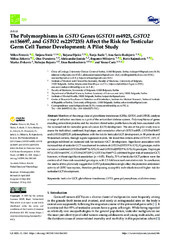Приказ основних података о документу
The Polymorphisms in GSTO Genes (GSTO1 rs4925, GSTO2 rs156697, and GSTO2 rs2297235) Affect the Risk for Testicular Germ Cell Tumor Development: A Pilot Study
| dc.creator | Petrović, Miloš | |
| dc.creator | Simić, Tatjana | |
| dc.creator | Đukić, Tatjana | |
| dc.creator | Radić, Tanja | |
| dc.creator | Savić-Radojević, Ana | |
| dc.creator | Zeković, Milica | |
| dc.creator | Durutović, Otaš | |
| dc.creator | Janičić, Aleksandar | |
| dc.creator | Milojević, Bogomir | |
| dc.creator | Kajmaković, Boris | |
| dc.creator | Živković, Marko | |
| dc.creator | Bojanić, Nebojša | |
| dc.creator | Bumbaširević, Uroš | |
| dc.creator | Ćorić, Vesna | |
| dc.date.accessioned | 2023-07-18T11:32:38Z | |
| dc.date.available | 2023-07-18T11:32:38Z | |
| dc.date.issued | 2023 | |
| dc.identifier.issn | 2075-1729 | |
| dc.identifier.uri | http://rimi.imi.bg.ac.rs/handle/123456789/1304 | |
| dc.description.abstract | Members of the omega class of glutathione transferases (GSTs), GSTO1, and GSTO2, catalyze a range of reduction reactions as a part of the antioxidant defense system. Polymorphisms of genes encoding antioxidant proteins and the resultant altered redox profile have already been associated with the increased risk for testicular germ cell cancer (GCT) development. The aim of this pilot study was to assess the individual, combined, haplotype, and cumulative effect of GSTO1rs4925, GSTO2rs156697, and GSTO2rs2297235 polymorphisms with the risk for testicular GCT development, in 88 patients and 96 matched controls, through logistic regression models. We found that carriers of the GSTO1*C/A*C/C genotype exhibited an increased risk for testicular GCT development. Significant association with increased risk of testicular GCT was observed in carriers of GSTO2rs2297235*A/G*G/G genotype, and in carriers of combined GSTO2rs156697*A/G*G/G and GSTO2rs2297235*A/G*G/G genotypes. Haplotype H7 (GSTO1rs4925*C/GSTO2rs2297235*G/GSTO2rs156697*G) exhibited higher risk of testicular GCT, however, without significant association (p > 0.05). Finally, 51% of testicular GCT patients were the carriers of all three risk-associated genotypes, with 2.5-fold increased cumulative risk. In conclusion, the results of this pilot study suggest that GSTO polymorphisms might affect the protective antioxidant activity of GSTO isoenzymes, therefore predisposing susceptible individuals toward higher risk for testicular GCT development. | |
| dc.publisher | Multidisciplinary Digital Publishing Institute (MDPI) | |
| dc.relation | info:eu-repo/grantAgreement/MESTD/inst-2020/200110/RS// | |
| dc.relation | info:eu-repo/grantAgreement/MESTD/inst-2020/200015/RS// | |
| dc.rights | openAccess | |
| dc.rights.uri | https://creativecommons.org/licenses/by/4.0/ | |
| dc.source | Life | |
| dc.subject | testicular GCT | |
| dc.subject | glutathione transferase | |
| dc.subject | GSTO | |
| dc.subject | gene polymorphism | |
| dc.subject | oxidative stress | |
| dc.title | The Polymorphisms in GSTO Genes (GSTO1 rs4925, GSTO2 rs156697, and GSTO2 rs2297235) Affect the Risk for Testicular Germ Cell Tumor Development: A Pilot Study | |
| dc.type | article | |
| dc.rights.license | BY | |
| dc.citation.issue | 6 | |
| dc.citation.spage | 1269 | |
| dc.citation.volume | 13 | |
| dc.identifier.doi | 10.3390/life13061269 | |
| dc.identifier.fulltext | http://rimi.imi.bg.ac.rs/bitstream/id/2966/life-13-01269.pdf | |
| dc.type.version | publishedVersion |

